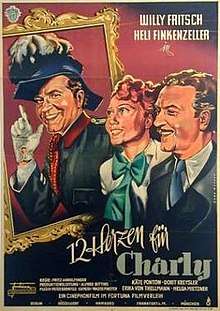Twelve Hearts for Charly
Twelve Hearts for Charly (German: Zwölf Herzen für Charly) is a 1949 German musical comedy film directed by Fritz Andelfinger and Elly Rauch and starring Willy Fritsch, Heli Finkenzeller and Dorit Kreysler. The film was temporary banned in the American zone of occupation because of its perceived negative portrayal of American soldiers.[1]
| Twelve Hearts for Charly | |
|---|---|
 | |
| Directed by |
|
| Written by | Karl Georg Külb |
| Starring | |
| Music by | Norbert Schultze |
| Cinematography |
|
| Edited by | Friedel Buckow |
Production company | Cinephon-Film |
| Distributed by | Fortuna-Filmverleih |
Release date | 6 May 1949 |
Running time | 96 minutes |
| Language | German |
Synopsis
Two twin brothers are separated at birth and one is raised in America while the other grows up in Germany. After the Second World War the American twin arrives as part of the occupation forces and leads a jazz band in his spare time. His brother, by contrast, teaches classical music at a girls school. After accidentally meeting, the two brothers decide to switch places, leading to many comic and romantic complications.
Cast
- Willy Fritsch as Dr. Wolfgang Amadeus Wagenbichler / Charly
- Heli Finkenzeller as Gabriele
- Käte Pontow as Annemarie
- Erika von Thellmann as Frau v. Auersbach
- Dorit Kreysler as Frau Eichhorn
- Penelope de Wall as Dorle, Kind
- Helga Mietzner as Maridl
- Wolf Harro as Toni, Sportlehrer
- Robert Demps as Georg Washington, Musiker
- Hans Hermann Pfeiffer as Dolmetscher
References
- Fay p. 126
Bibliography
- Bock, Hans-Michael & Bergfelder, Tim. The Concise Cinegraph: Encyclopaedia of German Cinema. Berghahn Books, 2009.
- Fay, Jennifer. Theaters of Occupation: Hollywood and the Reeducation of Postwar Germany. University of Minnesota Press, 2008.